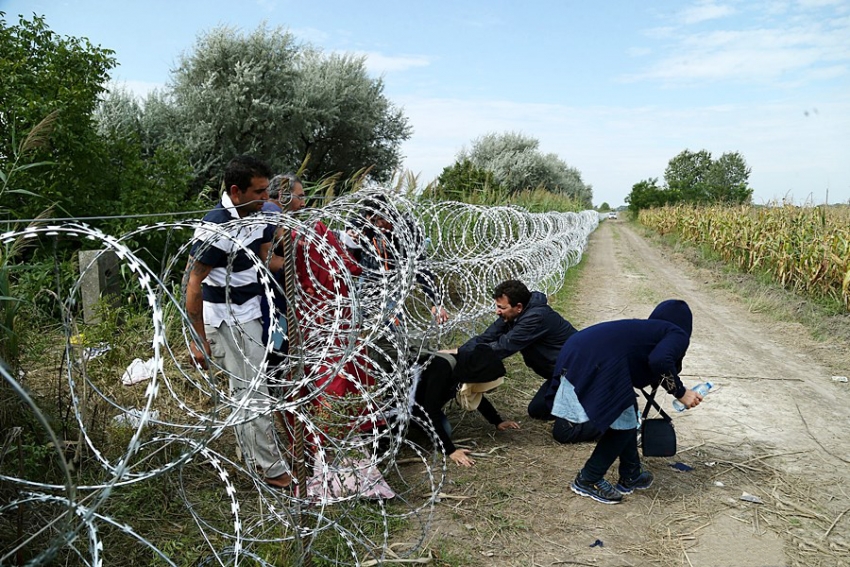
Who’s crisis is it?
by Makaela Lewis
With over a million migrants flooding into Europe in 2015 alone (BBC news), a crisis has come to our attention. The desperation of much of the world’s population due to wars, poverty, and a low quality of life in many eastern countries has been and currently is causing millions of families, women and children to risk their lives in pursuit of a better life on the other side. But is the other side really as desirable as it has been presented as? The so called ‘migrant crisis’ of today is a hot topic. As a country, we are constantly debating possible solutions to the abrupt influx of people into Europe, if Europe will cope under the strain and whether we have enough resources to give these people the necessities essential to their livelihood. There is copious talk about ‘them’ and ‘us’, so who’s crisis, really is it?
With much of the representation of migrants in the media having negative connotations, it must be questioned as to whose crisis we are referring to. Using words such as ‘swarming’ these people are commonly identified as a sub-human group, associated with being unwanted in our western society. Additionally, the media is able to dehumanise these people by often depicting them not as the individuals that they are, but as a mass group of ‘boat people’ that present a ‘threat to whiteness, and western, core values or democracy itself’ (Gale, 2004, pp. 322-323). Gale’s description of migrants coming from Eastern countries can illustrate the relationship between race and migration that allows them to be discriminated against. This depiction immediately allows the public to associate the word migrant with the ‘other’, in terms of race and culture.
It is interesting to note that the definition of migrant is ‘a person who is moving or has moved across an international border or within a State away from his/her habitual place of residence’ (International Organisation for Migration), meaning that essentially the student, and the traveller, are under the same title as the people that are moving from their country due to fear for their lives. With this in mind, it is easy to see how the media has led the wider public into perceiving migrants to fit a certain stereotype.
The idea of the ‘racialized other’ has come from the idea of a marginalised or alienated group in society. Looking at binaries helps to depict this, with many things having a direct opposite or contrast; female, male, fast slow, tall, short. This is crucial in maintaining an ‘us’ and ‘them’ attitude, with us as the norm, and migrants presented as the racial other and the ‘alien’. It must be considered that the migrants who are racialized are largely the ones from ethnic minority groups. In order for the racial majority to be the norm, there needs to be a group to alienate in society. Arguably, ‘whiteness’, and the need to marginalise another group in order to consolidate it has been the case for many years since colonisation, however, it reappears very significantly in modern society when racial others in the form of migrants can be easily scapegoated.
Sure, it is easy to understand why the European governments feel a sense of panic with the idea of taking on thousands of foreign people who may differ from us in culture and values, not to mention a sudden dramatic rise in population. This could potentially mean a lack of resources for the Citizens of Europe, the crash of welfare systems such as the NHS and the cliché British fear; ‘they’re taking our jobs’. But let’s look at this from a more pragmatic perspective. In actual fact, migrants may have a lot to offer European countries. The doctors, teachers, scientists, and people trained in the crucial occupations that we could benefit from are undoubtedly amongst the people that are moving from their countries, often away from war fare. Additionally, people migrating across the boarders are more likely to take up occupations that many British citizens refuse, therefore often filling vacant occupations. Some of our most major systems and the foundation of the UK and in Europe are upheld by migrants, who are we to say no to people who want to help?
More importantly, from an ethical and humanitarian perspective, we have a duty. We should stop thinking of benefits and gains that we can possibly squeeze out of people who are suffering or seeking a better life, and instead welcome them into Europe as part of our duty to our fellow human being. In actual fact, in 2005, over 25% of people who migrated to the UK, did so due to a definite job, with over 75% migrating for formal study (Migration Observatory). All migrants cannot be classed under the same bracket.
This is not to say that one country should be responsible for the entire migrant population. Inevitably, welcoming more people into a country will change the dynamics of the economy due to children and people who are unable to work. If most countries agree to welcome a set number of migrants, then the problem can potentially begin to be solved. This is a solution for the people who are moving their whole lives and families for safety and a better quality of life, but also for the countries who in all fairness, have a huge responsibility to take on. This responsibility is worth it. For the sake of our fellow mankind.
References
Gale, P, 2004. ‘The Refugee Crisis and Fear Populist Politics and Media Discourse’, Journal of Sociology, 40(4), pp. 321-340
BBC news
Migration Observatory

0 Comments